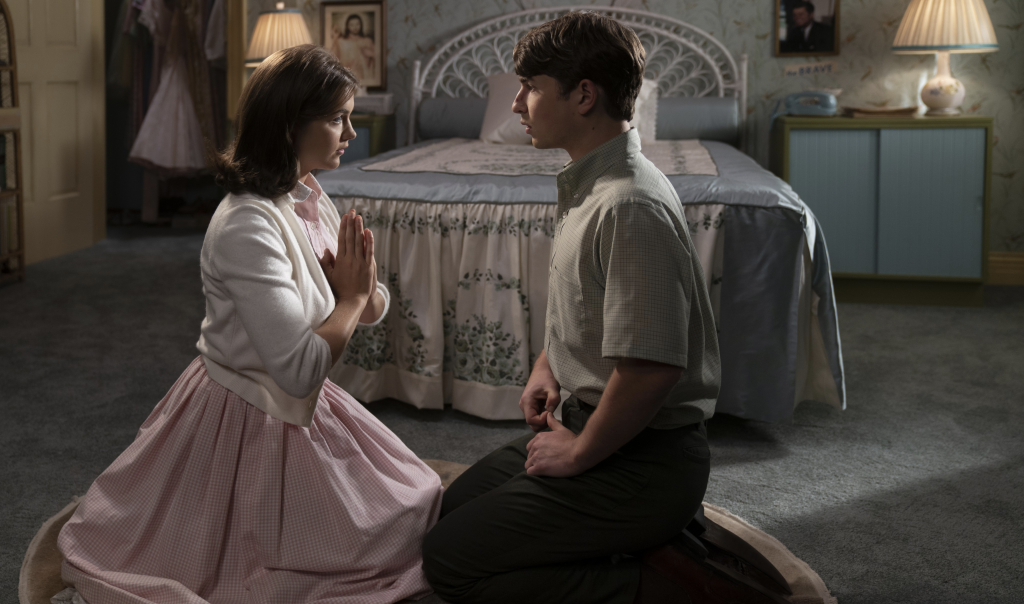A recent viewing of Steven Spielberg’s new semi-autobiographical film “The Fabelmans” reminded me of an observation from English writer Somerset Maugham in his memoir, “Summing Up.”
One of the benefits of writing fiction, Maugham pointed out, was that the author could take his revenge on people who had hurt him. I don’t think that was the case with Spielberg, who directed and co-wrote the movie. Rather, it is clear that in “The Fabelmans” he recreates his past in order to understand it.
I had no idea that his personal family drama included divorce and broken relationships, although some of his best work, like “E.T.,” “Close Encounters of the Third Kind,” explores family dysfunction.
In “The Fabelmans,” Spielberg entertains while wrestling with questions of identity, reconciliation, family drama, and the pains of adolescence. Religion also appears.
The story’s young protagonist, future filmmaker Sam Fabelman, encounters antisemitism after moving with his family from Arizona to California, when two bullies berate him for being Jewish and one calls him a Christ-killer. When one suggests he apologize for the death of Jesus, Sam says he sees no need since he didn’t live in Rome 2,000 years ago. (Spielberg surely knows Christ died in Jerusalem, but a high school kid might answer that way.)
Certainly, we couldn’t expect an invocation of St. Paul’s metaphor about Christianity being the wild branch grafted on to the good olive tree of Judaism. He graduated from high school before “Nostra Aetate,” the declaration of the Second Vatican Council that renounced any accusation that the Jewish people were in some way responsible for the crucifixion.
After all, a believer could have said to the bullies, Christ died for all our sins, implying that we all were his enemies. Be that as it may, Sam ends up with a bloody nose in the movie.
Because of the bullying, Sam ends up lying to the girlfriend of his aggressor and discovers an unlikely romance. Monica is a boy-crazy girl with pictures of the Sacred Heart and male film stars on her wall and a 5-foot crucifix above her bed and talks like a blend of a Billy Graham crusade and a television Pentecostal faith healer (nevertheless, she makes the sign of the cross before praying).
Her attempt to have him receive the Holy Spirit ends up with a first kiss, provoking so much laughter in the theater that I was glad no one could see my collar.
The girlfriend tells him she could not imagine living without believing in Jesus. His people have survived for 5,000 years without him, he points out.
“Did you find Jesus?” she asks when he gives her a golden cross on their prom date. “In the jewelry store,” he shoots back.
I suppose it’s an occupational hazard that a priest read such an exchange for its theological statement, but in this case, I had just finished reading “Old Truths and New Clichés,” by the late legendary Yiddish writer and Nobel Prize winner Isaac Bashevis Singer. His father was a Hasidic Orthodox rabbi who studied the Kabbalah and the teaching of Baal Shem Tov. His son developed his own idiosyncratic religion, inspired by the tradition but moving beyond it in many ways.
Certainly, I thought after watching the exchange, Judaism and Jewish culture have continued without belief in Jesus. But not without the idea of a Messiah.
Singer himself did not seem to move beyond the idea of the Messiah. In a discussion of Shabbatai Zvi, one of several figures in Jewish history who claimed to be the Messiah, Singer related the Jewish expectation of the Anointed One with the Christian doctrine of the Second Coming. Some of the rabbinic writing about when the Messiah will come reminds me of the Scripture readings for the end of the liturgical year, predicting terrible times and faithlessness in the world.
Reformed Judaism in the United States tended to move away from expecting a personal Messiah to hoping for a universal “Messianic Age.” But other branches of Judaism are still on the lookout for the advent of a real person: The Hasidic rabbi Shlomo Yehuda Beeri right now stirs a great deal of speculation. (Ironically, some evangelical Christian websites seem very interested in him, particularly Spanish-language ones.)
While religious Jews did not believe in Jesus, they seemed to be waiting for a redeemer. This is clear in Singer’s sometimes confusing remarks about the implications of the Kabbalah, where, according to his interpretation, God shrinks to make room for creation, but the story does not end there. In some ways, Judaism and Christianity are not separable religions.
To put it simply, we all need, as Paul Simon sang, “a shot at redemption,” Not just a personal redemption, but also a cosmic one. Catholics share with the Hasidim a hope for the completion of God’s will in creation. Belief in God transcends religious vocabulary but also illuminates it.
In America, religious differences are subject to a kind of intellectual prudery. We don’t want to talk about how our belief systems differ, and prefer ambiguity because we think tolerance depends on indifference. The result is not necessarily tolerance but just ignorance. Spielberg might think differently, but I thank him for the meditation prompt. Perhaps if his girlfriend had been more thoughtful...

